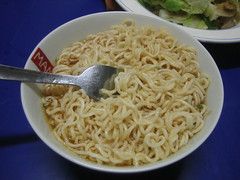Overeating noodles put students at risk

University students who are frugal on just baked beans and two-minute noodles are at greater risk of developing chronic diseases, according to a new Australian study.
Researchers Dr Danielle Gallegos and Kai Wen Ong surveyed 811 Brisbane-based university students on their household income, health and nutrition status, and access to food.
One in four of the study participants experienced food insecurity in the 12 months leading up to the survey, and six per cent reported to be repeatedly hungry.
Presenting her research at the Dietitians Association of Australia (DAA) national conference in Melbourne this week, Dr Gallegos said cash-strapped university students were prioritising university fees, accommodation and bills over discretionary expenses such as food.
She said that there seems to be an acceptance out there that getting by on less nutritious food is a typical part of being a university student.
Dr Gallegos further adds that diet of baked beans and instant noodles is not good enough when students put their health and academic results at risk
This culture is counterproductive to Australia becoming a 'smart' country.
Dr Gallegos said the study found that many university students found it hard to access nutritious foods, with about 50 per cent of students reporting their household income was $600 a week before tax.
Two-thirds of the food-insecure students in our study ate less than two serves of fruit per week and four per cent had no fruit at all, she said.
Dr Gallegos said vulnerable groups tended to eat more fast foods or energy-dense foods, like take-aways, as these were often viewed as more affordable and filling.
She said low income groups who found it difficult to eat a healthy, balanced diet were more likely to be either overweight or underweight, and were at a greater risk of chronic diseases like diabetes, cancer and heart disease.
jm





















